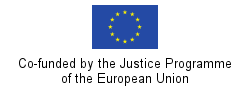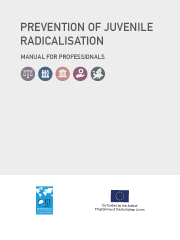
Microsite PRALT
PREVENTION OF JUVENILE RADICALISATION: MANUAL FOR PROFESSIONALS
This manual has been designed for professionals in the justice system working with children and young people in conflict with the law and will help professionals become familiar with current trends in Europe with regard to juvenile radicalisation.
However, the manual may also be a useful resource for members of civil society interested in the issues tackled in the manual. It can serve as a common reference to promote mutual understanding and trust, as well as to facilitate dialogue between judicial staff and members of society on the threats connected to radicalisation, human rights and fundamental freedoms as well as the potential role of communities in the process of prevention of radicalisation.
Its content, particularly the European examples featured, can also be used in traditional training courses designed to improve prevention strategies against the radicalisation of young people.
STRUCTURE OF THE MANUAL
The manual consists of five volumes:
- Volume I provides professionals and practitioners with the concepts, as well as the legal and policy instruments, needed to understand the context in which radicalisation particularly affects young people.
- Volume II provides the reader with an overview of prevention of crime in general, with particular focus on the prevention of radicalisation. It also gives some examples of programmes in Europe that are working to prevent radicalisation.
- Volume III focuses on alternatives to detention and community measures in the context of juvenile radicalisation. It provides an understanding of the different types of community sanctions and measures, their legal framework and their characteristics. It also gives some examples of community-based programmes being carried out in Europe with young people who are in conflict with the law.
- Volume IV provides the reader with an overview of prevention of radicalisation in the detention context. It gives professionals and practitioners the concepts and the instruments needed to understand the often vulnerable situation of children in detention, particularly with regards to the risks of them being radicalised. It sets methodologies for working with young people convicted of violent extremism offences, as well as after their release from detention. It also gives some examples of programmes in Europe that are working to prevent the radicalisation of children in detention, as well as programmes focused on their rehabilitation.
- Volume V presents the national reports of Belgium, France, Germany, Romania and Spain drafted by the project’s partners. The national reports assess the current situation of radicalisation in the project’s partners’ countries, with particular emphasis on the radicalisation of young people in detention.

The website section for this project was funded by the European Union’s Justice Programme (2014-2020). The contents of it are the sole responsibility of the “The prevention of juvenile radicalisation: Promoting the use of alternatives to detention through judicial training” project partners, and can in no way be taken to reflect the views of the European Commission.
